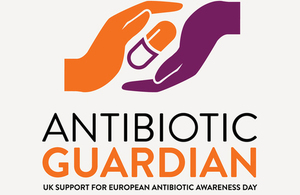Join over 1,500 antibiotic guardians: choose a pledge today to help tackle antibiotic resistance
Make your pledge today and become an antibiotic guardian.

Antibiotic Guardian
Antibiotic Guardian, an initiative developed by Public Health England (PHE) is urging members of the public and healthcare professionals to join in the campaign and take action and help make sure antibiotics work now and in the future.
To become an Antibiotic Guardian people choose and enact a pledge about how they will make better use of antibiotics. This campaign forms part of activities that support European Antibiotic Awareness Day (EAAD).
The website asks users to choose which category they would like to make a pledge in. For healthcare professionals and leaders, there are 10 categories from GPs, nurses, vets, commissioners, government officials and public health specialists. For members of the public there are 4 choices including parents of small children, pet owners and farmers. The available pledges change per category and those responding will be asked if PHE can follow-up to confirm they did keep their pledge.
For example, members of the public can choose from a range of pledges, including the following:
- the next time I have a cold or flu I pledge to try treating the symptoms for 5 days rather than going to the GP
- the next time I have a cold or flu I will talk to the pharmacist first about how I can treat their symptoms rather than making a GP appointment
- It is vital we prevent antibiotics from getting into the environment. I pledge to always take any unused antibiotics to my pharmacy for safe disposal
And GPs can choose, among others:
- when I see a patient with a self-limiting illness, I will discuss methods of controlling symptoms rather than prescribing antibiotics
- when I see a child with a respiratory tract infection (coughs, colds, sore throats, and ear aches) I will use the TARGET guide to treat your infection booklet rather than prescribe antibiotics
- the next time I intend to prescribe antibiotics for a self-limiting infection to a patient with high expectations of antibiotic treatment, I will use a delayed/backup prescription
Healthcare leaders can choose; among others:
- I will visit my local hospital, community pharmacy or general practice surgery to show support for European Antibiotics Awareness Day during EAAD week (18 to 22 November 2014)
- I will ensure that the executive team and board are regularly informed about Antimicrobial Stewardship and AMR in my Trust
- I pledge to incorporate Antimicrobial Stewardship and Resistance as a quality measure within my commissioning pathways (including out of hours)
Dr Diane Ashiru-Oredope, Lead for EAAD 2014 at Public Health England, said:
Everybody can help to tackle antibiotic resistance and we really urge people to help us do this. There is a lot to be done but we can start by making inroads into inappropriate prescribing.
There are 2 elements to this. One is that we need patients to not always expect to receive an antibiotic for those self-limiting illnesses which are typically caused by viruses. This generally includes those where the symptoms include coughs, runny noses, muscle aches and fever. And the other is for GPs not to feel pressurised into prescribing antibiotics when they aren’t really necessary.
Community pharmacists and their teams also have a key role and should be seen as the first port of call for many winter illnesses caused by viruses. They can also help to manage patients’ expectations by explaining the normal duration of these symptoms, what warning signs to look out for and providing effective over the counter treatments that will help relieve the symptoms.
Nicholas Brown, President at the British Society for Antimicrobial Chemotherapy (BSAC), said:
Recently published research in BSAC’s Journal, Journal of Antimicrobial Chemotherapy, confirms that despite government recommendations to reduce prescribing for viral illnesses there are still many GPs who do this. Of course GPs don’t want their patients to feel unwell but there are many medicines which are available over-the-counter which can really help to reduce symptoms and make people feel better.
We want to encourage everyone to self-treat as much as possible when it is safe and appropriate to do so. By using antibiotics only when they are needed we can all help to make sure that we keep our antibiotics working for everyone in the future.
Antibiotic resistance is one the biggest threats to public health and PHE is delivering 4 key aspects of the 5-year UK strategy to help combat antibiotic resistance. These are improving infection prevention and control practices to reduce the number of infections in patients; optimising prescribing practice, improving professional education, training and public engagement and enabling better access to and use of surveillance data.
Ends
Notes to editors
- Read the PHE English surveillance programme antimicrobial utilisation and resistance report
- The Antibiotic Guardian website and logo have been kindly sponsored by the British Society for Antimicrobial Chemotherapy (BSAC).
- You can make a pledge on the Antibiotic Guardian website.
- Read the latest edition of the Journal of Antimicrobial Chemotherapy.
- Plans for European Antibiotic Awareness Day in England and development of the Antibiotic Guardian campaign has been led by PHE in collaboration with Department of Health, its Expert Advisory Committee on Antimicrobial Resistance and Healthcare Associated Infections (ARHAI); the Veterinary Medicines Directorate, the devolved administrations and professional bodies/organisations (for human and animal health) towards the “One Health” approach.
- Public Health England exists to protect and improve the nation’s health and wellbeing, and reduce health inequalities. It does this through advocacy, partnerships, world-class science, knowledge and intelligence, and the delivery of specialist public health services. PHE is an operationally autonomous executive agency of the Department of Health. Website: www.gov.uk/phe. Twitter: @PHE_uk, Facebook: www.facebook.com/PublicHealthEngland
UKHSA press office: National Infection Service
UKHSA press office, infectious diseases
61 Colindale Avenue
London
NW9 5EQ